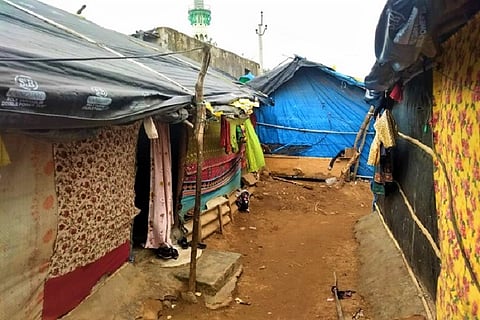

“Coming to Hyderabad has allowed me to get the education I always wanted but never would have gotten back there,” says Ashiqullah, an 18-year old Rohingya Muslim from Myanmar, India’s neighbour. He and his family came to Hyderabad 6 years ago as refugees under extraordinary circumstances.
“We left our home at midnight when heavy firing was going on, we had to go across a few rivers to get to the Bangladesh border,” he recalls. Ashiqullah’s family was then intercepted by the Bangladesh military and was told that they would be sent to India where they would have more opportunities for a better livelihood. Ashiqullah is now entering Class 9 in a government school in the city along with several other refugee children. He is just one amongst nearly 700 Rohingya children living in the refugee settlements in Balapur, a suburb of Hyderabad.
The area is home to approximately 3,800 Rohingya Muslims, who live in 26 settlements in small houses with very basic amenities. Most of the adults work daily wage jobs to make ends meet because they lack formal education and are restricted because they are considered illegal immigrants in India. Save The Children, an NGO, took over responsibility for the Rohingya Muslims in this area in 2015 and has worked to ensure that the settlements’ children receive education.
“We have registered 690 children in formal education schools, of which 450 are studying in government schools,” Asif Mohammed of Save The Children, who is in charge of the Rohingya children of this area, tells TNM.
Asif is also responsible for the day school in Balapur, where all the refugee children are given basic education and training that will enable them to join schools and receive formal education. “We teach them Hindi, English, Urdu and Maths for a year using syllabus and materials made exclusively for the Rohingyas by the State Council of Educational Research and Training (SCERT),” explains Asif.
This transition period of one year is also called bridge school because it acclimatises the children to a new country with new languages and different cultures. Vikas Gora, General Manager of Save The Children for South India, says, “These refugees who lack basic education and knowledge were forced to come into a new country. They need conditioning to live in a society which is brand new for them.” This project was aided by the United Nations High Commissioner for Refugees (UNHCR) and is funded by the Department of School Education, Telangana. “The state government has supported us wholeheartedly and they truly deserve credit for supporting the education of these children,” Vikas adds.
Another issue is that the immigrants are not citizens of India and hence do not have any proof of identification that is validated by the government. They have to make do with UNHCR ID cards, which are not accepted by many organisations including schools. A few of the Rohingya children were not granted admission into SSC colleges because they didn’t have Aadhar cards to prove their identification and date of birth.
The Indian government has been taking a hard stance against the refugees. Earlier this month, the UNHCR condemned the Centre’s decision to deport a few Rohingyas back to Myanmar and urged the authorities to stop such forced deportations, which are prohibited under international law.
Hitting back, Ministry of External Affairs spokesperson Raveesh Kumar said, “The repatriation of illegal immigrants to their country of origin is in accordance with Indian laws. These actions are being taken in response to the instructions of India’s courts, which have required government at the state and union levels to detect, detain and deport illegal immigrants.”
“In this sense, the government will continue to take actions as may be necessary in implementation of Indian laws, and as directed by our judiciary,” he added.
The Rohingya are ethnic Muslims who have lived in the Rakhine province of Myanmar for centuries. Nearly a million of them have escaped the country since 2012 to Bangladesh and India after they faced severe hostility in their country. They were evicted from their homes, their lands confiscated and their villages attacked by the military with several of them put into concentration camps. The United Nations has recognised the Rohingyas as one of the most persecuted ethnic groups in the world. Several international organisations have requested India not to deport these refugees.